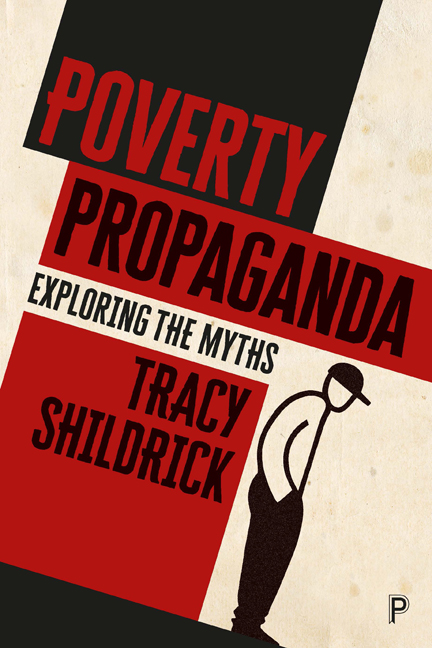Book contents
- Frontmatter
- Contents
- List of abbreviations
- Acknowledgements
- One Introduction
- Two Poverty propaganda
- Three Poverty and lived experiences
- Four Poverty, labour markets and ‘poor work’
- Five Poverty, social class and social immobility
- six Poverty: discrimination, stigma and shame
- Seven Poverty propaganda and reproduction of poverty, power and inequality
- Eight Conclusions
- References
- Index
Eight - Conclusions
Published online by Cambridge University Press: 09 April 2022
- Frontmatter
- Contents
- List of abbreviations
- Acknowledgements
- One Introduction
- Two Poverty propaganda
- Three Poverty and lived experiences
- Four Poverty, labour markets and ‘poor work’
- Five Poverty, social class and social immobility
- six Poverty: discrimination, stigma and shame
- Seven Poverty propaganda and reproduction of poverty, power and inequality
- Eight Conclusions
- References
- Index
Summary
Alcock (2006, p 200) notes that
To identify oneself as poor is to identify oneself as having a problem and being in need of help. This is a negative categorisation, which people desperately trying to survive, perhaps with dignity, in a hostile world may not willingly and openly wish to adopt.
It is the core contention of this book that the nature of poverty and the ways in which it is understood and conceptualised both politically and popularly have changed since the mid-1970s, with the pace and nature of change accelerating since 2010. Many myths and untruths abound and the realities of poverty and the limitations it places on people's lives and life chances have been obscured behind a divisive and deliberately generic set of discussions and sound bites that play up ideas of ‘welfare dependency’ and troubled individuals and families. The realties and hardships of poverty have been masked and lost behind myths and untruths, while poverty as a condition affects more and more British citizens. Such is the power of poverty propaganda that even those people who are badly affected by poverty and its effects are keen to disassociate themselves from the condition (Shildrick and MacDonald, 2013). Deliberately punitive policies that deepen poverty and extend the condition to more people have become acceptable to a general public that is largely seduced by the simple notion that those experiencing poverty are culpable for their own situations. Failure to escape poverty is thus both an individual failing and a source of pain and shame (Walker and Chase, 2014). The lack of decent work opportunities, the growth of insecure and low-paid employment and its role in fostering poverty manage to go largely unremarked upon. Further, the brutal and humiliating treatment of many forced to rely on out-of-work benefits is also allowed to pass with barely a murmur (Cooper and Whyte, 2017). The growth of what I term the messy middle and the desire of most people to belong somewhere within it and to disassociate themselves from poverty and related disadvantages means that poverty can continue to be at one and the same time both normalised and also stigmatised and misrepresented.
- Type
- Chapter
- Information
- Poverty PropagandaExploring the Myths, pp. 151 - 158Publisher: Bristol University PressPrint publication year: 2018



